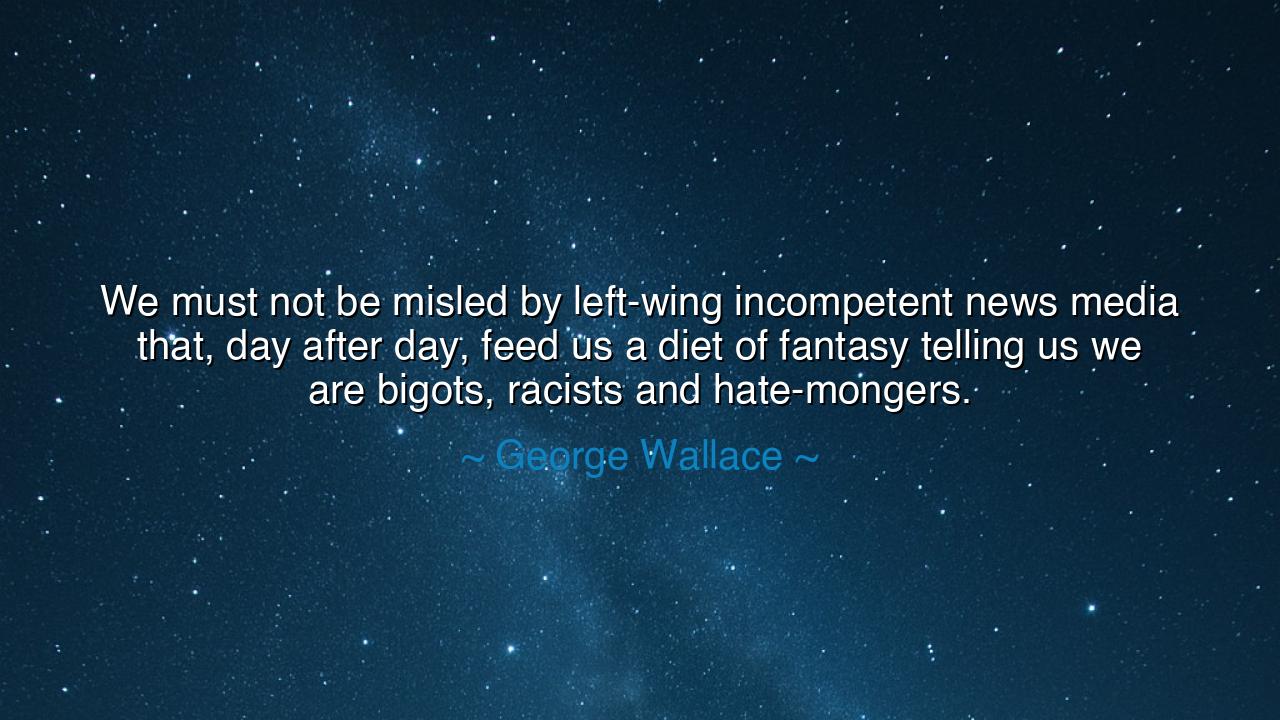
We must not be misled by left-wing incompetent news media that
We must not be misled by left-wing incompetent news media that, day after day, feed us a diet of fantasy telling us we are bigots, racists and hate-mongers.






In the words of George Wallace, “We must not be misled by left-wing incompetent news media that, day after day, feed us a diet of fantasy telling us we are bigots, racists, and hate-mongers,” there rises the voice of a man entangled in the storm of his age—his words born of conflict, division, and the struggle over truth itself. Though rooted in the politics of his time, his warning transcends the particular and echoes through the ages: beware the illusion of perception, for those who control the story can shape the world. Whether one agrees with his views or not, the essence of his message lies in a timeless truth known to every ancient sage—that the mind is the first battlefield, and that deception, not the sword, is the most subtle weapon of tyranny.
To speak of a “diet of fantasy” is to speak of the poison of falsehoods—nourishment that sickens rather than sustains. In the olden days, the philosophers of Greece warned of such corruption of thought. Plato, in his Allegory of the Cave, described men chained to shadows, mistaking illusion for truth. So too did Wallace, in his own fiery way, accuse the media of being the shadow-casters of his era—feeding the people not reality, but reflection, shaping opinion through repetition rather than wisdom. Whether or not his enemies were guilty as charged, the deeper meaning of his words remains: that a people unguarded in thought are easily ruled by deceit.
When Wallace denounced the “incompetent news media,” he spoke from a time when the United States was torn by social upheaval, by the struggle for civil rights and the redefinition of justice itself. His own place in history was controversial—many saw him as a defender of segregation, others as a man transformed in later years by repentance and reflection. Yet his distrust of the press mirrors a sentiment as old as power itself. From the emperors of Rome to the rulers of Athens, those who held the pen often shaped the destiny of nations. The ancients understood that stories mold souls, and that the teller of stories wields influence more enduring than armies.
There is, in his phrasing, an anger—an accusation of being misrepresented, of being reduced to labels like “bigot” or “hate-monger.” Here we see the age-old wound of the human spirit: to be misunderstood. In every generation, there are those cast as villains by the chroniclers of their age. Some deserve their fate; others are victims of the narratives that surround them. The Roman general Cato the Younger fought against Caesar’s rise to power, believing himself a guardian of the Republic, yet history often painted him as obstinate and proud. So too, Wallace’s lament reveals not merely political frustration, but a universal cry—that the truth of a person or a people should not be shaped solely by the words of others.
Yet, even in his fury, his words contain a shadow of warning for all mankind: to question the diet of thought we are fed. The ancients taught that the mind, like the body, becomes what it consumes. To feast on lies is to grow sick in spirit; to live only on outrage is to wither in understanding. If one allows external voices—be they kings, priests, or newsmen—to determine reality, then freedom fades, for the greatest slavery is of the mind. Thus, whether one stands with Wallace or against him, his warning remains a call to intellectual vigilance: never surrender the sanctity of thought to the noise of propaganda.
But there is another lesson hidden in his lament, one that transcends politics: that truth must be pursued with humility, not pride. The danger of Wallace’s tone—and of any who speak in anger—is that in rejecting the illusion of others, one may create illusions of one’s own. The ancient Stoics would remind us: it is not enough to resist deception; one must also resist bitterness. For when outrage governs reason, the search for truth becomes yet another kind of blindness. The wise, therefore, do not merely accuse—they examine, discern, and listen, for wisdom is found not in noise, but in balance.
Let this be the teaching passed down: guard your mind as you would guard your freedom. Question what you are told, but do not let suspicion curdle into hatred. Seek clarity, not comfort. Read not only the words that please you, but those that challenge you. For in the clamor of the world, where voices seek to divide and define, the one who can see beyond the surface will remain free. The ancients knew this truth well: a mind that hungers for truth will not be fooled by the diet of fantasy.
Thus, the wisdom hidden in George Wallace’s words, stripped of their fury, speaks to all ages: beware of being fed your thoughts by others. For truth is not given—it is sought, tested, and earned. And the one who dares to seek it, even amid the chaos of voices, walks the same path as the philosophers, prophets, and reformers of every age—the path of the free and the thinking soul.






AAdministratorAdministrator
Welcome, honored guests. Please leave a comment, we will respond soon